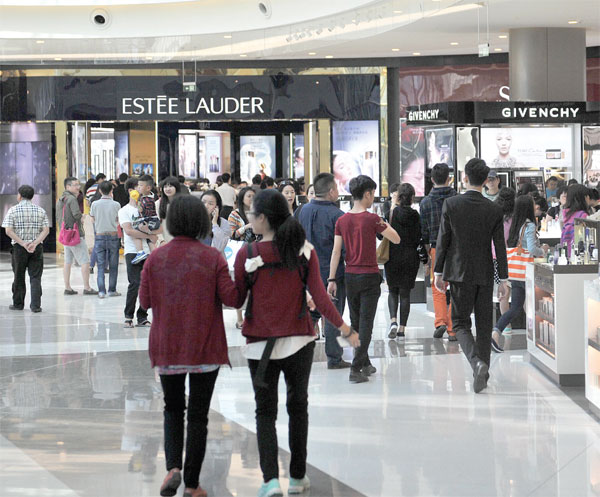Luxury sales lagging in China
Sales of luxury goods in China hit a roadblock in 2014, due in part to changing consumer preferences and the country's economic slowdown, analysts said.
Last week LVMH Moet Hennessy Louis Vuiton SA, the world's largest luxury-goods maker, reported full-year (2014) earnings that missed analyst expectations, and cosmetics company Estee Lauder trimmed its 2015 earnings guidance. Both companies cited slowing sales in China in part for the downbeat news.
As the global luxury market adjusts to lower but more sustainable growth over the long-term, mainland China trails and last year showed for the first time a negative trend: negative 1 percent growth at approximately 115 billion yuan ($18.41 billion), according to global consultancy Bain & Co.'s 2014 China Luxury Market Study released last month
Bain said this was brought on by changing customer dynamics, an influx of new luxury label, and an economic slowdown.The slump in luxury goods sales in China may also be a result of the ongoing anti-corruption and frugality campaigns, factors that have undermined luxury gifting in the country, said Bruno Lannes, a partner with Bain.
"There are many parallels between the 2008 financial crisis and today's austerity measures in China. Back then luxury was redefined from ostentation to a more understated design and messaging - less became more," Diana Verde Nieto, CEO and co-founder of Positive Luxury, a United Kingdom online consumer guide said in an e-mail to China Daily.
The New York Times reported on Feb 7 that luxury goods makers now are focusing on the United States and its ultrarich "over Hong Kong magnates or Russian moguls as their biggest drivers of growth".
The newspaper reported that stock market gains and an economic recovery in the US have led to an increase in the number of American millionaires by 1.6 million, according to Credit Suisse estimates, "by far the biggest increase in the world and dwarfing the 90,000 Chinese who crossed the million-dollar mark since then."
"In 2014, Americans with net wealth of more than $50 million outnumbered their Chinese counterparts eight to one. And the United States is set to remain by far the wealthiest country, Credit Suisse says, with aggregate wealth of over $114 trillion in 201," according to the newspaper.
Cara David is a managing partner with YouGuv, an Internet-based market research firm. She leads the Survey of Affluence and Wealthy, an ongoing study in partnership with Time Inc that has been expanded from the US to include other countries including China. The survey questioned 400 affluent Chinese who ranked in the top 2 percent of income earners in the country.
David said the respondents weren't worried about the national economy but 71 percent said they were concerned about political corruption. She also said 90 percent said they were looking forward to buying more luxury goods.
"I think what we are seeing is that the Chinese consumer is becoming a more mature consumer," she said and that may be contributing to the slight decline in luxury purchases last year.
Another factor affecting luxury sales is a preference for overseas shopping by the Chinese. The Bain study said total luxury purchases by Chinese consumers overseas rose by 9 percent to $81 billion while luxury purchases in the domestic market declined by 11 percent to $25 billion. About 70 percent of luxury brands bought by Chinese are now bought abroad or through daigou or overseas personal shoppers. In terms of travel destinations, Korea and Japan were the big winners in 2014.
David said this is a definite trend noting that 62 percent of her survey respondents said they travel to shop
"Chinese consumers now spend more than three times the amount abroad than they do locally, preferring overseas brands design, country of origin and authenticity of products," added Verde Nieto.
She also expects the luxury slowdown to be temporary "The forecast looks promising for the luxury industry within the Chinese market," she said.
David seemed to agree. "I am not an economist but I think people grow into affluence and if China can continue to grow that segment, the market will show it."
Until recently, the luxury goods market was riding alongside China's economic boom. Consultancy McKinsey & Company predicted in 2011 that China would account for about 20 percent of the global luxury market by this year.
paulwelitzkin@chinadailyusa.com
|
Chinese customers shop luxury goods in Haitang Bay, the world's largest duty-free shopping center, in Sanya, Hainan province, Jan 1,2015. The annual New Year holiday is a high season for consumer spending. Yang Guanyu / Xinhua |





















